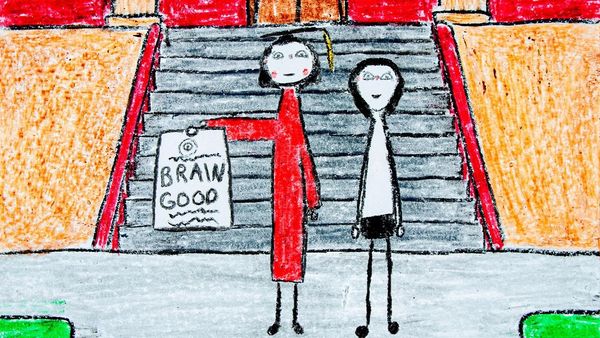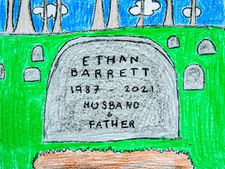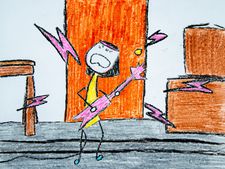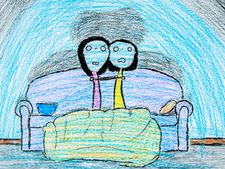 |
| Rosemary A.D. (After Dad) |
If you’ve ever been to a film festival, the chances are that, somewhere in a corner of the programme or on a dedicated screen, you’ve come across a short film strand. If you’ve talked to people watching it, you’ll have found that a lot of them make short films themselves. Obviously you won’t catch the next big hit at a strand like this, and often you’ll be able to sit there for an hour and not see a single face you recognise on the screen, but – hit and miss though these things are – you might just see something that takes your breath away. Little films like Ethan Barrett’s Rosemary AD (After Dad) can take your breath away.
 |
| Rosemary A.D. (After Dad) |
Short film is the beating heart of cinema – an artistic playground in which people with low budgets and limited time can get creative, free from the pressures that studios and funders create, telling the stories that matter to them. At some film festivals, some of these films get picked up for awards. This gives them the chance to break through into the big league, maybe even making it as far as the Oscars or the BAFTAs. Some of the world’s most famous directors got their start this way. Rosemary AD was not quite that successful, but it did attract serious praise for a film made by a complete beginner with, as Ethan readily admits, limited skills. I met him at a Q&A for animators where he talked about his process and the very personal background to this poignant piece of work.
“Rosemary AD (After Dad) is about me and my daughter Rosemary,” he begins, adding helpfully “I'm the dad. She's Rosemary.” He blushes slightly, not used to this sort of event, and with difficult things to discuss. “It's basically, I imagine how her life could go if I commit suicide. Ever since I was a child, I had a lot of struggles with depression, especially in my teen years, and that came to a head a few years ago when I was hospitalised. It's always been a heavy thing that's on my mind, and I've been through a lot of therapy and a lot of different things, but it was always something that was always in the back of my mind. And then when my daughter Rosemary was born, it came to a head and it felt like I had to make a decision. Am I going to make my daughter grow up with a depressed dad, you know?
“I just didn't feel like I was able to fill that role completely. And so I started doing research about the effects of parental suicide on children, and I was hoping I might find some good stories, but actually, it was mostly sad stories and really negative effects. And so I just started imagining all the ways her life could go. I started journalling good ways her life could go, bad ways her life could go. And I processed that a lot. And then naturally, I thought, ‘This will make a great cartoon!’” He laughs.
 |
| Rosemary A.D. (After Dad) |
I ask him about the humour that is present in the film, bringing a lot of heart to it.
“The humour was really important, because it was such a heavy topic,” he says. “I didn’t think anyone would want to sit through such a dark film so I tried to bring a light-hearted approach to gently ease people into the film. I think humour is a nice way for people who struggle with mental health to find some light in this world.
“I always think that it's no coincidence that most of the greatest comedians in the world have always struggled with mental health, because it's something that you learn to live with. You learn to find light in every situation because you're kind of forcing yourself to, and it's also a coping mechanism. Otherwise, how can you make it through the day? So you just learn to find humour in everything. And so to me, it was very natural. Sometimes I had to pull the humour back a little bit so that we can focus on the story.”
Did he have any prior experience in animation?
“No,” he says, matter-of-factly. “ In fact, I've always considered myself a really bad artist. Yeah, I basically knew nothing about animation, but I was stuck at home taking care of an infant and so I thought – well, I wanted to make a film, so I just started drawing with crayons one day. And if you can imagine knowing nothing about animation, basically that was where I was. So what would you do? How do you make a picture that you drew into a cartoon? I just started drawing pictures one after another, and started taking pictures with them on a camera, first on a tripod, and then I built a better rig to take overhead pictures, and just took thousands of pictures.
 |
| Rosemary A.D. (After Dad) |
“I ended up with something like 2,700 separate eight-and-a-half-by-eleven pieces of paper with crayon on. I just took those pictures, and then all the sound and the music I did myself as well. I did most of the voices but my wife also provided some, and Rosemary did as well. So it was all a very homemade, family made project.”
Time aside, it was also a very low cost project, he adds.
“Overall, the budget was less than $100. Maybe just crayons and paper.”
The result has changed his life. He now has a feature film in development, and although it’s clear that life can still be difficult for him, this emerging career – and Rosemary, of course – have made the future look a lot brighter.





















